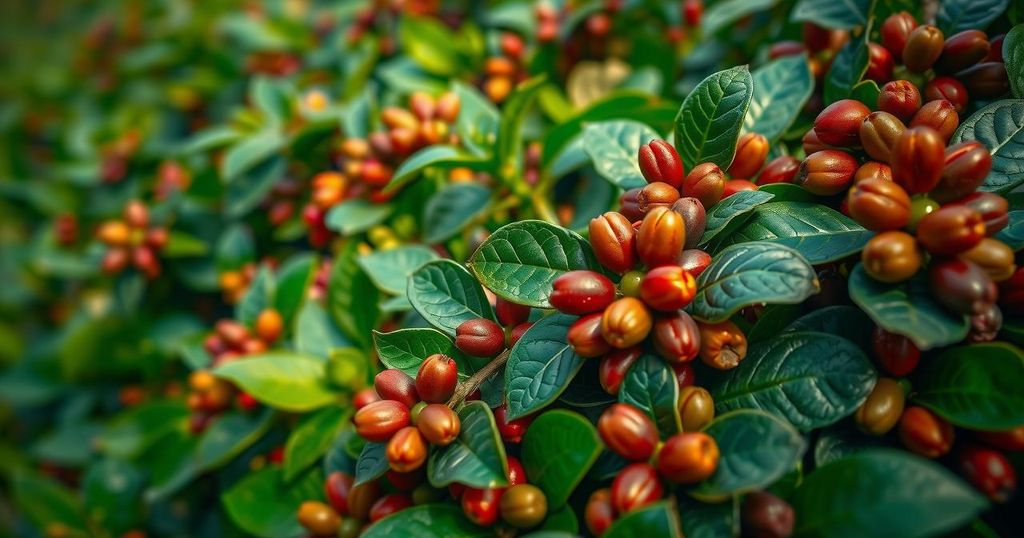Severe Droughts in Brazil and Vietnam Drive Record Coffee Prices
Global coffee prices have hit a record high, spurred by severe droughts in Brazil and Vietnam. The El Niño phenomenon and climate change are reducing coffee yields, threatening farmer livelihoods. By 2050, suitable coffee-growing areas may shrink significantly, leading to higher consumer prices and prompting companies to adapt their strategies in response to these climate challenges.
Coffee prices have recently surged to a record high, driven by severe droughts in Brazil and Vietnam, the primary producers of coffee globally. Extreme weather fueled by the El Niño phenomenon and climate change has triggered damaging crop losses. Projections indicate that by 2050, suitable conditions for coffee cultivation could diminish by half, impacting farmers in developing countries significantly. Consumers might face skyrocketing prices, prompting companies to explore various strategies to mitigate the effects of climate change.
Brazil is currently experiencing an unprecedented drought affecting nearly 60 percent of its coffee-growing regions, exacerbated by high temperatures resulting from El Niño and climate change. Furthermore, decades of deforestation have altered rainfall patterns, worsening the situation. In addition to drought, extensive wildfires caused by slash-and-burn agriculture have devastated coffee yields. Vietnam’s coffee growers have also suffered from similar climate impacts, including recovery challenges from recent typhoons.
Although rainfall in October provided some hope for crop recovery in Brazil, many farmers fear it may be too late to salvage their coffee trees. Elizabeth Shapiro-Garza, an environmental policy expert, highlighted that coffee serves as an early indicator of climate change’s agricultural impact. The arabica variety, favored for its flavor, is particularly susceptible to rising temperatures, which threaten its optimal growing regions.
The market has reacted dramatically, with arabica bean prices skyrocketing nearly 70 percent this year. Major companies, including Nestlé, are adjusting to the crisis by increasing prices and reducing product sizes. The CEO of illycaffè emphasized the urgent need to address climate change’s market impact. Starbucks is investing in coffee production in Central America to diversify sources, while other businesses are investigating alternative crop solutions to replace traditional coffee.
As these changes unfold, the coffee industry faces unprecedented challenges due to climate-induced transformations in agriculture, making it crucial for stakeholders to adapt accordingly.
The article discusses the recent surge in global coffee prices due to catastrophic droughts affecting Brazil and Vietnam. These countries are responsible for a significant portion of the world’s coffee supply, and the ongoing climate crisis has exacerbated their agricultural outputs. Extreme weather, driven by the El Niño effect and global warming, threatens the viability of coffee cultivation, with grave implications for farmers and consumers alike. By examining the impact of such environmental shifts, the article presents a broader picture of the future of coffee production under climate change pressures.
In conclusion, the current climate crisis poses dire challenges for the coffee industry, particularly in Brazil and Vietnam, where droughts have devastated crops and inflated prices significantly. The situation underscores the necessity for coffee growers and industry leaders to adapt their practices in response to ongoing climatic shifts. As the industry navigates these challenges, consumer prices are likely to increase further, highlighting the urgent need for innovative solutions to combat the impact of climate change on global agriculture.
Original Source: insideclimatenews.org




Post Comment